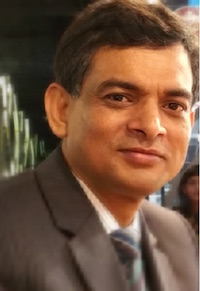 Moinul Khan
Moinul Khan
Director General, Customs Intelligence and Investigation Directorate
Bangladesh Customs, Ministry of Finance
Public Finance Program (’03)
Please tell us about your career path so far. What is your area of specialization and how did you come to work in this area?
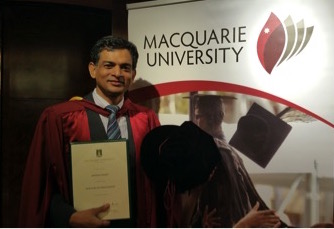
PhD Award in hand from Macquarie University, Australia
I joined the Bangladesh Civil Service (Customs and VAT) through a very competitive exam back in 1994 and was recruited as Assistant Commissioner. Since then I have engaged in taking up challenges relating to my job mainly in realizing tax revenue for the government while enforcing border protection. I also got involved in knowledge-based specialization in the government to keep myself competitive. Since my joining, I have worked in different capacities including Deputy Commissioner, Joint Commissioner and Additional Commissioner before becoming Director General of Customs Intelligence and Investigation. Throughout my twenty years of career, I spent about eight years in foreign countries to pursue studies including a PhD degree. First I did my MBA on an AusAID Scholarship at the University of Queensland, Australia, in 1999-2001. Then I did my Master of Public Finance (Customs) at GRIPS on a WCO-Japan Government Scholarship in 2002-2003. Finally, I completed my PhD in International Security at the Centre for Policing, Intelligence and Counter Terrorism, Macquarie University, Australia, in 2014. My specialization includes areas of fiscal policies, customs enforcement, trade facilitation, border management and international security. The training that I took up has raised my career profile to a high level, leading to my appointment as the Director General.
You have recently been appointed as Director General of Customs Intelligence and Investigation Directorate. What are your main responsibilities and duties?
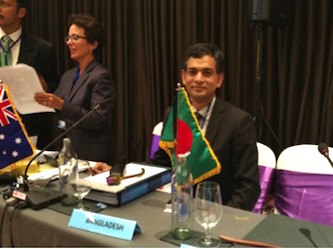
Attending a conference on Customs Intelligence in Colombo, Sri Lanka, 2014
As DG, I lead the Directorate, which has a staff of 329 people. These people are employed in different places including four regional and 17 circle offices at the field level throughout the country. We have also some institutional network and interactions with other agencies both within and beyond the borders. The main responsibilities include the collection of information, analyzing it and converting this information into intelligence, sharing those intelligences with stakeholders where appropriate, and investigating some violations and enforcement when necessary. We are primarily an intelligence agency, but we do intercept cargoes and movement of passengers where cases of serious irregularity occur.
In your current capacity, what do you see as the main opportunities and challenges for Bangladesh over the course of the next five to ten years.
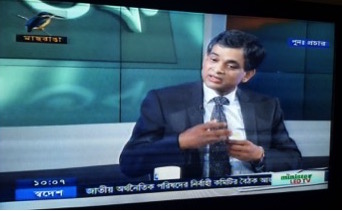
Moinul participated in a TV talk show in Dhaka on recent achievements in gold smuggling crackdown
My primary job is to ensure the adoption of an appropriate border control mechanism as far as the import and export of goods, and the movement of people are concerned. While doing this, I also take care of the facilitation of trade and movement of passengers at the sea, air and land ports. To address the key challenges, the government has planned to effect a more trade-friendly environment where resources will be employed to risky cargoes and passengers while giving faster and easy clearance to others. These include instituting a single window project, Authorized Economic Operator, automation and risk management policy.
What are some of the biggest challenges you face in your work? And what have been the most interesting or rewarding aspects of your career thus far?
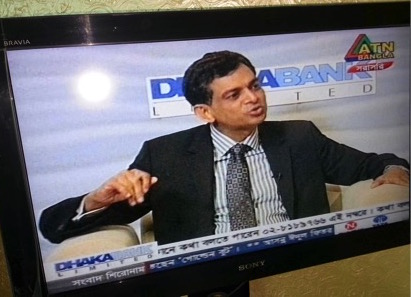
Attending a live media show on Customs and VAT policies
The biggest challenge I face in my work is the limited resources and capacity to deal with a huge number of smuggling and revenue evasion cases. I know that this cannot be overcome easily so I should better utilize these resources and capacity to maximize the achievement. To that end, I carefully assess the issues and prioritize accordingly to achieve the most out of it. This has so far worked well. The interesting aspect of this strategy is that the number of interventions is minimum, but the degree of impact is heavy, visible and long lasting. The deterrence effect is also noteworthy. The rewarding aspect of my tenure is that I can demonstrate the result of my strategy in an upward graphical representation. For example, our directorate seized 793 kg of gold with 92 people arrested on charge of smuggling at the airports in the last 18 months while it was 12 kg of gold in the five years preceding my tenure. This achievement is, of course, rewarding for my future career.
What led you to GRIPS? What is the most important thing you got out of your studies here, and how has your experience at GRIPS prepared you for future endeavours?
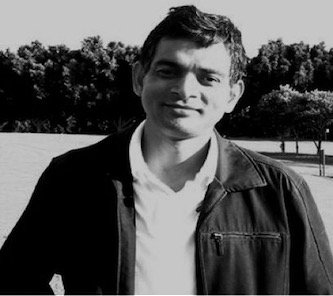
Casual session in Sydney, Australia
I came across a brochure of GRIPS in 2002 and upon reading it I realized that GRIPS was the one that offers a specialized Masters program in fiscal policies and customs. There were not many institutes offering such a purely professional degree at that time. Since I was planning to specialize in customs related areas I felt the urge to apply for this program. The most important thing of these studies is that I learnt the broader aspects of economic and more specifically fiscal policies under which customs are operated. Without this knowledge, it would have been difficult to comprehend the dynamics and trends as far as the customs functions are concerned. The complex theoretical knowledge that I gained through studies and more importantly the field trips to Japan Customs has broadened my eyes and mind to work as future leader in the government.
What is your fondest memory of your time spent at GRIPS? And what do you miss about Japan?
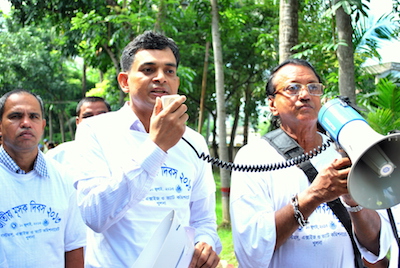
Addressing an awareness gathering on Customs and VAT in Khulna, Bangladesh, 2013
The fondest memory of my time is the friendships that I built during the studies at GRIPS. I am still having some form of interactions with those friends living at different places around the world. My family members who lived with me still remember those days in Japan. The most pleasant aspect was the living in Odaiba, a man-made island and surrounded by sea. I could see the seawaters from my room and walk to the sea within a short time. It gave us a heaven-like feeling and comfort.
How do you maintain a balance between your work and the rest of your life? And what is your favourite thing to do when you are not working?
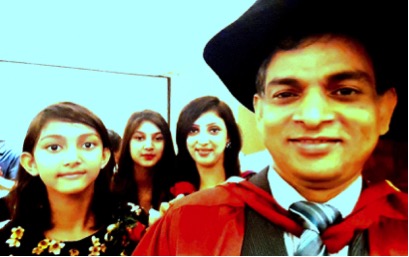
Family members attending Moniul’s PhD graduation
To speak very honestly, in my present position I find it difficult to strike a good balance between my work and the rest of my life. Still, I give value to my personal, family and social activities as much as possible. I believe work is for life, life is not for work. That is why planning is critical to have a good balance. When I am not working, I try to spend quality time in interacting with my family members and friends. I also try to write fictions, travel stories and articles and many of them have been published in magazines, newspapers and books.
If you could give one piece of advice to anyone considering studying at GRIPS what would it be?
Networking is very important and you may try to build friendship with other fellows as much as possible. This friendship may add value to further your career. Who knows, at some point in your
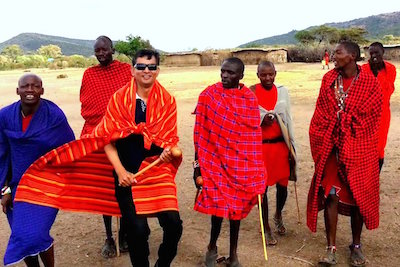
Cheering with Masai people while attending a conference in Kenya, 2013
career you may meet your old friends in a very big and responsible role.
How would you like to maintain involvement with the School? What do you expect from GRIPS as an alumnus?
I highly acknowledge that GRIPS is behind my career progression. I owe much to the School. I like to be connected with GRIPS in its endeavors and contribution to creating both national and global leadership.
Do you have any suggestions on how to further utilize the GRIPS alumni network?
The GRIPS alumni network could better utilize its resources to bring the people together through a more effective engagement. This may include inviting old graduates to GRIPS to give lectures, share experiences and participate in seminars with existing students and faculty members. This would facilitate the get-together on the one hand and reinforce the friendship centering around GRIPS on the other.




